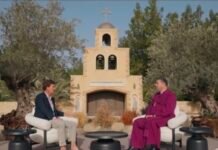Years after it receded from prominence with the winding down of Latin American revolutionary movements and their patronage by the Soviet Union, liberation theology is finding a positive reception within an unlikely group — the Anglican Church in North America (ACNA).
As part of a celebration of Hispanic Heritage Month, the ACNA’s Diocese of Churches for the Sake of Others (C4SO) made available a reading list this autumn. Among the recommended books is A Theology of Liberation(1971) by Roman Catholic priest Gustavo Gutiérrez of Peru, regarded as one of the founders of liberation theology. The reading list prompted critical reaction online.
“Liberation Theology is at the least a distortion of the Gospel,” wrote Mark Marshall, an Anglican lay person who attends a Reformed Episcopal parish, about the C4SO book list on Stand Firm, a traditionalist blog known to throw elbows in theological disputes. “Why does C4SO seem not to care about the division they create in ACNA when they push such error?”
For its part, the colorful diocesan page cheerily read that “A great way to celebrate Hispanic Heritage Month is through reading, which can strengthen our ability to understand the feelings, beliefs and experiences embedded in Hispanic culture.”
It seemed like a good time to make an inquiry. Diocesan staff kindly connected me with the Rev. Dr. Shawn McCain, Rector of Resurrection South Austin and drafter of the reading list, and a short while later we spoke.
McCain explained that C4SO Diocesan Bishop Todd Hunter asked for a recommended reading list with the goal of “What’s some important Latino theology that we could celebrate?”
The C4SO list features books by more than twenty authors. Among the recommended titles is Gutiérrez’s A Theology of Liberation. But liberation theology is homage to only a very small part of Latin Christianity – it does not feature prominently in the Charismatic revivals that have swept Latin America, nor is it widely circulated in the vibrant Spanish-language church planting movements of the United States. Pentecostal and traditionalist Catholic thinkers likely represent many more tens of millions.
“This is a gift and good challenge for people in the ACNA in our shared mission,” McCain told me of Gutiérrez’s book. “So, I personally don’t see the issue here.”
McCain characterizes some, but not all, of the critical reaction as not good faith engagement, often by those unfamiliar with the work of Gutiérrez. He described some of that speech as uncharitable, even ungodly.
“Often the pushback is responding to a caricature” that doesn’t appreciate the context of extreme poverty from which this book speaks, McCain assessed. That included my own description of liberation theology as presenting Jesus to be a political revolutionary intent upon overthrowing the forces of “empire” rather than an atoning sacrifice to reconcile God and mankind.
McCain insists that Gutiérrez understands Jesus foremost as the messiah, and not merely a political revolutionary, though his reign has real-world implications for the established powers. That Gutiérrez portrays Jesus as anything less is “not a good faith engagement,” he argues.
What of academic work critiquing the writing of Gutiérrez? Does that count as good faith engagement? The late IRD board member Michael Novak’s 1986 book Will it Liberate? critiqued the shortcomings and limitations of liberation theology while making the case for a democratic social order and economic liberation that would better deliver justice for the poor and oppressed.
Gutiérrez’s work received significant pushback within the Roman Catholic Church: the Dominican priest came within one vote of having his ordination condemned by a closely divided assembly of Peruvian bishops. Liberation theology was critiqued by two successive popes: John Paul II and Cardinal Joseph Ratzinger (later Benedict XVI).
John Paul II rejected some of the main theses of liberation theology, contesting early in his papacy the assertion that “the Gospels should be re-read from the point of view of the oppressed”. According to National Catholic Reporter Vatican Affairs correspondent Peter Hebblethwaite, the pontiff denounced it as “ideological conditioning.”
Ratzinger, while serving as prefect of the Congregation for the Doctrine of the Faith (the Vatican doctrinal body), warned of liberation theology’s danger in fusing “the Bible’s view of history with Marxist dialectics.” The German Cardinal termed liberation theology a “singular heresy” and a “fundamental threat.”
The Austin, Texas rector maintains that Gutiérrez denounces Marxism – the Peruvian Priest stated in 2015 that Marx saw Christianity as oppression, while his work is committed to the view that “Christianity is liberation.” But liberation theology and revolution often found themselves overlapping on the same ideological real estate. In the 1970s and 1980s liberation theology had strong influence on the ecumenical movement, including the World Council of Churches. Several leftist Latin American presidents – Brazil’s Lula da Silva, Bolivia’s Evo Morales, Ecuador’s Raphael Correa, Nicaragua’s Daniel Ortega and Paraguay’s Fernando Lugo (himself a former bishop) – each had close contact with liberation theologians.
McCain is correct to note that Gutiérrez finds a better reception from the current Pope, Francis.
“Considering their [John Paul II and Benedict XVI] cold war context I am sympathetic to their criticism, but I think Francis’ Latin American roots and proximity to extreme poverty earlier in his life help him more deeply appreciate Gustavo,” McCain appraised. Gutiérrez is “a sophisticated theologian, especially in his approach to theological praxis, putting the church to work for the needs of the real world.”
The Anglican clergyman maintained that, as a Dominican priest and theologian, Gutiérrez can’t be easily dismissed by Catholics or Protestants, noting that in 2010 he was conferred the honor of “Magister Sacrae Theologiae” in the Dominican order of Preachers, placing him alongside Albert the Great and Thomas Aquinas.
McCain also raises the issue of race and ethnicity.
“So often when people of color offer, like Latino/a theologians, offer something shaped from their experiences (which is characteristic of all theological works) … It is received not only with a lack of charity, but a lack of desire to understand where that work is coming from on its own terms,” McCain argued. “I am concerned about what is behind the vitriolic reactions from those who have not read or attempted to understand Gutiérrez’s work.”
A spotlight on C4SO and what it promotes isn’t surprising: the diocese is far from a fringe outlier. In 2020, C4SO was the single largest diocese in the ACNA measured by attendance and membership. It is also among the fastest growing, adding 1,046 members (10%) and 1,907 attendees (11.7%) the same year. It has the most congregations of any ACNA diocese (55) and includes one of the largest congregations in the ACNA (Christ Church Cathedral in Plano, Texas) that hosted the denomination’s 2019 Provincial Assembly. The diocese has clergy whose published works reach far beyond ACNA: Liturgy of the Ordinary author the Rev. Tish Harrison Warren (Christianity Today 2018 Book of the Year) and New York Times contributing opinion writer and Reading While Black author the Rev. Esau McCaulley among them. (Warren is on staff at McCain’s parish).
Numerical growth comes from success at planting churches and reaching those new to Anglican Christianity, especially those from evangelical backgrounds. But few enter ACNA from a vacuum: just as those who arrived from liberalized Mainline Protestant denominations (including the Episcopal Church) have their baggage, those who arrive from evangelical backgrounds pendulum swing away from the embarrassing excesses of their own former spiritual home. What hallmarks they preserve — and what sensitivities they retain from past conflict — are influenced by those former contexts.
Regardless of how liberation theology may have been rebuffed in the past, McCain argues it has a place within the ACNA today.
“I see his [Gurierrez’s] witness as resonating with Jesus reading Isaiah 61: ‘The Spirit of the Lord is upon me, because he has anointed me to proclaim good news to the poor,’” McCain reflects. “His [Gurierrez’s] witness is compelling and enduring to this day.”



